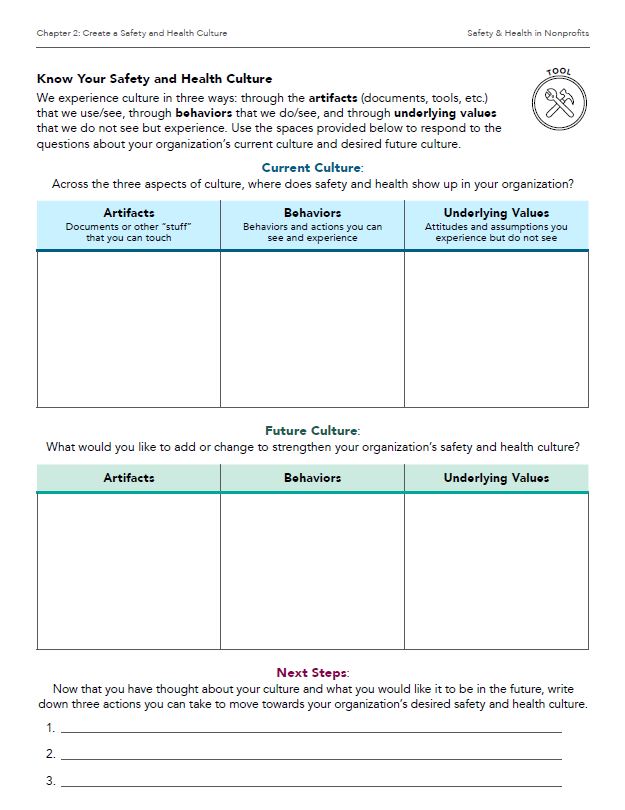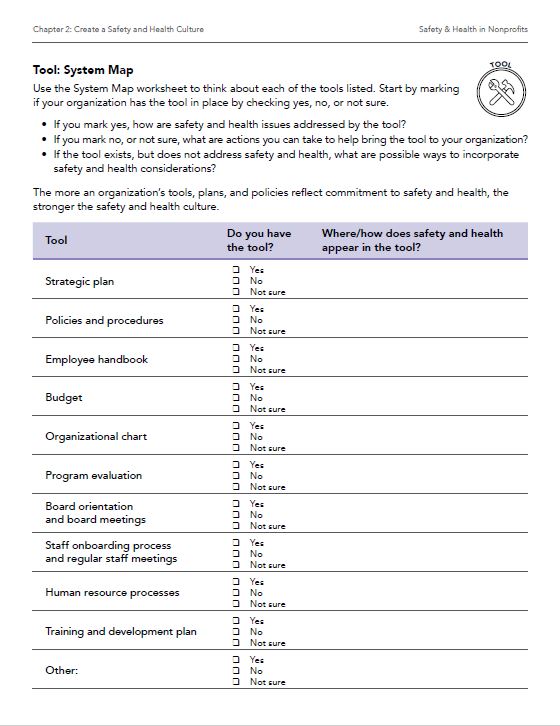With an understanding of the three aspects of culture, you can now work on building a strong safety and health culture for your organization.
Topics Covered:
Assess Your Culture

Tool: Know Your Safety and Health Culture Worksheet
Remember, culture can change, and the tools provided are designed to help you do so.

Know Your Safety and Health Culture Worksheet
The Know Your Safety and Health Culture Worksheet is designed to help you work through the visible and invisible aspects of the safety and health culture in your organization.
DownloadUnderstand Your People
A strong culture requires buy-in from every level of the organization. Highlighted in the guide’s introduction, the levels include those within your organization (board, leadership, staff, and volunteers) and those served by your organization (clients, participants, or members). As you work to understand the people and levels of your nonprofit, consider formal networks defined by organizational structures and clear lines of authority, as well as informal, social networks that connect people to each other through friendship, kinship, or some other relationship.
As you think about your nonprofit’s people, name who holds the role of overseeing safety. Larger organizations may have a specific safety staff person, while smaller organizations often do not. For smaller organizations, having a senior staff person or board member oversee safety as a clear part of their responsibilities is helpful. As new people join the organization, an orientation process for staff and volunteers that includes a review of safety and health topics goes a long way to instill a strong sense of culture within your team.
Map Your Systems
A nonprofit has several levers (tools, policies, plans, etc.) in place to assist in creating a strong safety and health culture. Use the provided System Map worksheet to note which tools your organization currently has and how safety and health shows up within the tool. In addition to mapping your organization’s systems, take the time to survey the leadership and staff to gain important insights about safety and health in your nonprofit. Use the Safety and Health Leadership and Staff Survey to help assess how systems and practices are actually working.

Tool: Systems Map Worksheet
Use the System Map worksheet to think about the tools and systems in your nonprofit. The more an organization’s tools, plans, and policies reflect commitment to safety and health, the stronger the safety and health culture.

System Map Worksheet
This System Map worksheet will help you evaluate what systems you currently have in place that address health and safety in your organization.
Download
Tool: Safety and Health Leadership and Staff Survey
Have your leadership and staff complete this survey to gain a better understanding of where your organization is at. Conduct this survey on a regular basis to chart changes over time.

Safety and Health Leadership and Staff Survey
This Safety and Health Leadership and Staff Survey is one way you can evaluate the safety and health culture throughout your organization and how your systems are working.
Download